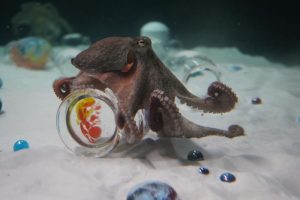Last week i was in Belgium with a long list of exhibitions to see but the Summer & sun-phobic that i am chickened out, hid in a cave and saw only a couple of them. One was in Antwerp, city of art and creativity but also major European harbour which makes it the idea place to show Allan Sekula‘s subtle and engaging commentary on flows of goods, globalization and conditions of the invisible workers in the maritime industry.
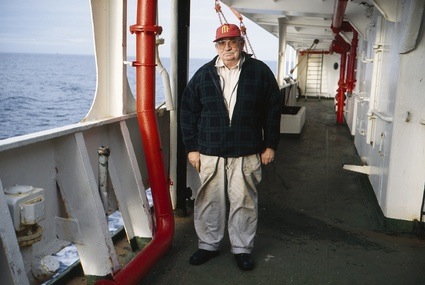 Allan Sekula, Crew Portraits, from Ship of Fools, 1999-2010, courtesy Christopher Grimes Gallery, Santa Monica en Galerie Michel Rein, Paris
Allan Sekula, Crew Portraits, from Ship of Fools, 1999-2010, courtesy Christopher Grimes Gallery, Santa Monica en Galerie Michel Rein, Paris
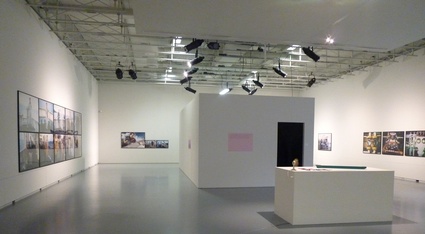 View of the exhibition space
View of the exhibition space
Titled Ship of Fools, the exhibition features the Global Mariner, a converted cargo ship that toured the world between 1998 and 2000, carrying an exhibition denouncing working conditions in the shipping industry and more particularly a practice called Flag of Convenience. This system allows a ship owner to register their vessel in a foreign (and often poor) country either to reduce operating costs or to evade international laws and regulations. Both, most of the time. The system is facing fierce criticisms because it allows shipowners to be legally anonymous and makes it difficult to prosecute in civil and criminal actions. Flag of convenience ships have sometimes been found engaging in arms smuggling, people trafficking, are frequently found offering substandard working conditions, and damaging the environment, primarily through illegal and unregulated fishing. Not to mention some of the most infamous oil spills in history.
In 2009, more than half of the world’s merchant ships were registered under flags of convenience. Unfortunately, the system goes hand in hand with globalization. Today, some 90% of non-bulk cargo transits by sea inside containers.
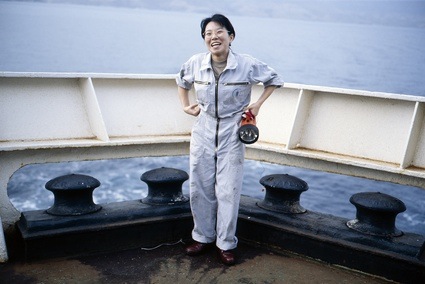 Allan Sekula, Crew Portraits, from Ship of Fools, 1999-2010, courtesy Christopher Grimes Gallery, Santa Monica en Galerie Michel Rein, Paris
Allan Sekula, Crew Portraits, from Ship of Fools, 1999-2010, courtesy Christopher Grimes Gallery, Santa Monica en Galerie Michel Rein, Paris
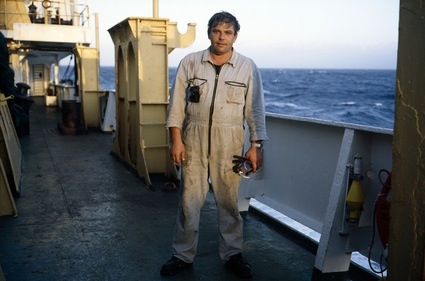 Allan Sekula, Crew Portraits, from Ship of Fools, 1999-2010, courtesy Christopher Grimes Gallery, Santa Monica en Galerie Michel Rein, Paris
Allan Sekula, Crew Portraits, from Ship of Fools, 1999-2010, courtesy Christopher Grimes Gallery, Santa Monica en Galerie Michel Rein, Paris
In the video interview below, Sekula explains to Curator Grant Watson that although the maritime industry is a victim of the economic crisis, it is also responsible for two key maritime inventions that made globalization possible. Containers make it possible to move factories anywhere in the world in search of the cheapest labor, opening up new opportunities to globalize the production of goods. Flags of convenience globalized the labor market for seafaring. Containerization and flags of convenience set the machine in motion and we are now living with the consequences.
Allan Sekula, Ship of Fools. Interview by Grant Watson (M HKA)
Sekula traveled with the Global Mariner over intervals, followed their defense of workers’ rights and portrayed the crew and its journey in a series of photos. Sekula’s portraits of seafarers, dock workers, port cities and their industrial hinterland register the affects of globalisation on people’s lives. By presenting this ensemble of work, the artist counters the myth that underpins neoliberal ideology of painless flows of goods and capital that constitute international trade.
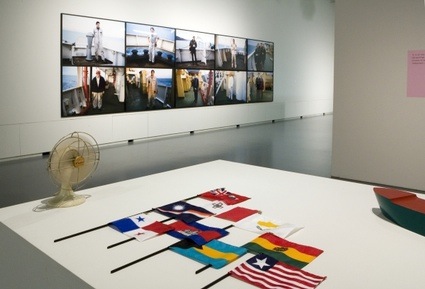 Allan Sekula, Ship of Fools exhibition view, 2010. Photo M HKA
Allan Sekula, Ship of Fools exhibition view, 2010. Photo M HKA
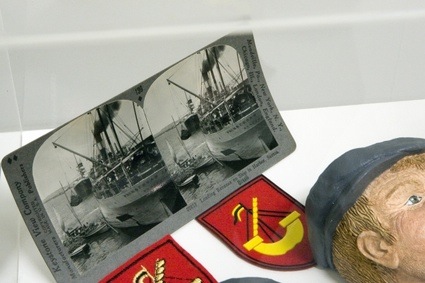 Allan Sekula, Docker’s museum (version 1 for Antwerp and Santos), 1999-2010. Courtesy Allan Sekula, Christopher Grimes Gallery, Santa Monica en Galerie Michel Rein, Paris. Photo M HKA
Allan Sekula, Docker’s museum (version 1 for Antwerp and Santos), 1999-2010. Courtesy Allan Sekula, Christopher Grimes Gallery, Santa Monica en Galerie Michel Rein, Paris. Photo M HKA
Don’t miss the PDF of Alla Sekula’s essay Ship of Fools.
Ship of Fools is a cooperation between M HKA and the FotoMuseum. It is open until September 4 at the 4th floor of the FotoMuseum in Antwerp. Ship of Fools will then travel to Brazil where it will be part of the 29th São Paulo Biennial.

